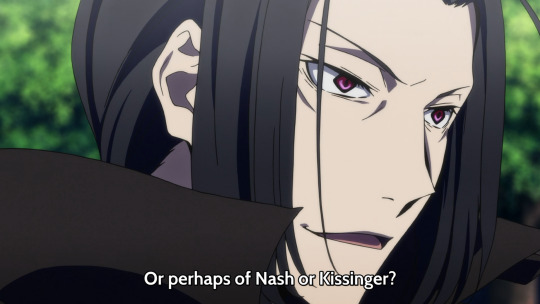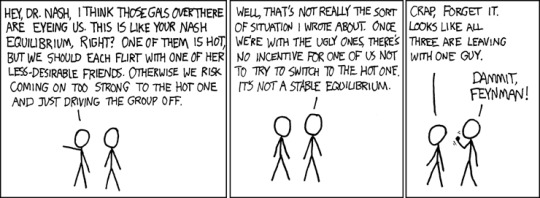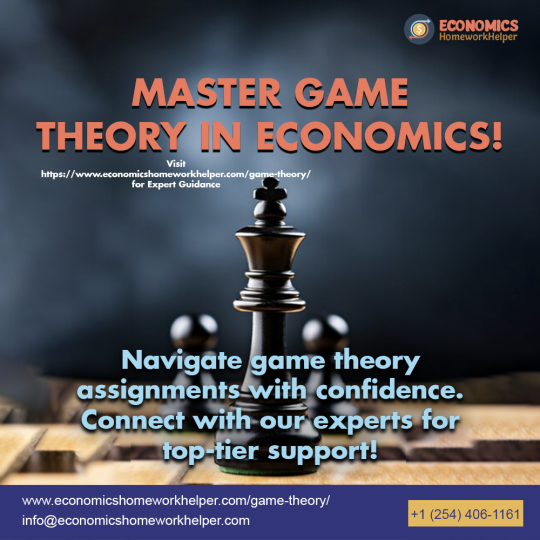#Nash Equilibrium
Text
Nash Equilibrium suggest the most likely Event and Outcome of Procreation is that every woman immaculately conceives and every child is an Annointed One.










#Nash Equilibrium#Theology#ideal#Game Law#What is Is#immaculate Conception#Annointed One#royalty#Real#Royal#Kings#Queens#The Kingdom#simple#easy
0 notes
Text
Game Theory in Business Strategy: Predicting Competitor Moves
Excited to share my new blog on Game Theory in Business Strategy! 🎯 Discover how mathematical models can transform your strategic planning and decision-making. Your feedback is always welcome! #GameTheory #BusinessStrategy 🚀
Today, we’re diving into a fascinating realm where mathematics, psychology, and business strategy converge. Yes, we’re talking about game theory.
Game theory, a concept that has its roots in mathematics, has found its way into the boardrooms of the world’s most successful companies. It’s a tool that can help businesses predict competitors’ moves, make strategic decisions, and ultimately gain a…

View On WordPress
#business strategy#competitive intelligence#competitors#decision making#game theory#Nash equilibrium#pricing models#prisoner&039;s dilemma#strategic planning
1 note
·
View note
Text
trying to get my mum to watch a beautiful mind with me and say it’s revision for my game theory exam
#‘if we watched a beautiful mind do you think it counts as-’ ‘no’#it’s one of her fave films when I found out it was about the nash equilibrium guy I felt so betrayed#like wowwww ur gonna economicsify a film I’ve seen on and off for years? do you want to shoot me next? take everything at this point#nash why did you dooooo this I was rooting for you we were all rooting for you#hella goes to uni
13 notes
·
View notes
Text
i need to make. a got damn spreadsheet
#of games. like which ones are coordination which ones have nash’s equilibrium which ones are strategyproof et cetera#samael speaks
5 notes
·
View notes
Text
A Beautiful Mind is such a wonderful movie!
#a beautiful mind#I’m have an econ degree so I very much admire the father of game theory#the Nash equilibrium#learned about him in 2015 in high school psychology#learned more about him in game theory#one of the most interesting econ classes I took#economics#Sarah rambles#john nash
6 notes
·
View notes
Text
I'm reading this Chinese web novel and tell me why the author has citations in the authors notes each chapter 😭
#so far theyve cited schrodingers cat nash equilibrium and maslows hierachy of needs#why am i actually learning stuff dog this is an abo isekai story
0 notes
Text
Problem solving: Severn Trent Services- Supplier Selection, Tender Evaluation and Recommendation
CW2:
Introduction
The current reflective essay is citing my learning and experience throughout the understanding of negotiation game in purchase and procurement. However, the learning and experience with upcoming practices in purchase and procurement. Throughout the discussion in this reflective report, the key focus will be negotiation for the business conflicts during the course of supply and…
View On WordPress
#accommodation#accommodation strategy#collaboration#competitive strategy#compromise and competitive strategy. The accommodation strategy#Compromise strategy#course of supply and buying#forming strategies#game theory and Nash equilibrium concept#Gibbs Reflective Model#managing the interests and conflicts of demand and supply in procurement function#Negotiation#negotiation for the business conflicts in supply and buying#reduce the carbon emission#reflective essay#research paper#resource allocation#Severn Trent Services#Sodra timber and negotiation games#Supplier Selection#supply and buying#sustainability perspective#Team coordination and communication#Tender Evaluation and Recommendation#Thomas Kilmann instrument#Timber case study#VRIO framework#win-lose Lose-Lose#win-win
0 notes
Text


When Mori talks about Nash in relation to war strategy, it's because of Nash's contribution to game theory (the Nash equilibrium). Game theory is a model that helps interpret interactions between players, and while it can be (and is) also applied to analysis of war strategy, it is a bit of a stretch to say that Nash, who was a mathematician, studied war strategies (as far as I'm concerned, he very much did not. To say Nash was an academic who studied war strategy is inaccurate). It's still funny that Mori is bringing up game theory again after (inaccurately) talking about it in the last season 1 episode, he must really like it.
It's a bit destabilizing to see Kissinger being mentioned here– because differently from all the other authors and thinkers fleetingly mentioned in bsd, it's one that feels close in time and inseparable from our world's history (the fact alone that he was still alive when this episode aired is terribly disorientating for me). You can't think of Kissinger without thinking about the Cold War, but it's unfeasible to think the bsd universe experienced something akin to our Cold War. Anyways, he was one of the main enablers of the realist theory as an international relations school of thought, which I suppose is a theory that fits Mori to a tee.
#I'm not familiar enough of Schelling to confidently talk about him :( But if anyone wants to add to this 👀👀👀#ōgai mori#bsd#bungou stray dogs#bsd s2#bsdrewatch2023#Also Mori bringing up western figures while Fukuzawa replies mentioning a Chinese one further emphasizes the west vs. east symbolism :)
33 notes
·
View notes
Text
if two girls were mutually crushing on each other, don't you think that despite this being a game with imperfect information, they would both stand to gain from confessing? isn't confession optimal for both of them? isn't it Nash equilibrium? isn't it fucking pareto optimal? FUCK
40 notes
·
View notes
Text

Maybe someday science will get over its giant collective crush on Richard Feynman. But I doubt it!
Nash [Explained]
Transcript Under the Cut
[Cueball and Dr. Nash (the Cueball-like guy to the right) stand talking to each other. Cueball is looking left and pointing off-panel.]
Cueball: Hey, Dr. Nash, I think those gals over there are eyeing us. This is like your Nash Equilibrium, right? One of them is hot, but we should each flirt with one of her less-desirable friends. Otherwise we risk coming on too strong to the hot one and just driving the group off.
[Cueball is now looking at Dr. Nash.]
Dr. Nash: Well, that's not really the sort of situation I wrote about. Once we're with the ugly ones, there's no incentive for one of us not to try to switch to the hot one. It's not a stable equilibrium.
[Cueball again looks left while Dr. Nash shakes his fist.]
Cueball: Crap, forget it. Looks like all three are leaving with one guy.
Dr. Nash: Dammit, Feynman!
15 notes
·
View notes
Text
Fun Social Experiment for those who studied Information Science and Nash Equilibrium
if > 50% of ppl choose the green pill, everyone lives.
if not, people who chose the purple pill live and people who chose the green pill die.
25 notes
·
View notes
Text

Winning Moves: A Guide to Game Theory Homework Success
Game Theory, a branch of mathematics and economics, analyzes strategic interactions among rational decision-makers. As students dive into the complexities of Game Theory, they often find themselves grappling with intricate concepts and challenging problem sets. If you find yourself in a situation where you need personalized guidance, searching for "Write My Game Theory Homework" or "Game Theory Homework Help" can lead you to professional services. Whether you're seeking assistance online or looking to tackle the problems on your own, this guide will pave the way for Game Theory homework success.
Understanding the Basics
Before delving into specific strategies, it's crucial to have a solid understanding of the basics of Game Theory. Familiarize yourself with key terms such as players, strategies, payoffs, and Nash equilibrium. If you're unsure about any concept, don't hesitate to consult your class notes, textbooks, or reliable online resources. Establishing a strong foundation will make the subsequent moves in your Game Theory journey much smoother.
Write My Game Theory Homework – Online Assistance
One winning move in your Game Theory homework strategy is seeking online assistance. The internet is a vast repository of knowledge, and there are dedicated platforms that offer expert help.
Online Game Theory homework help services often employ experienced tutors and experts in the field who can provide step-by-step explanations and solutions to your homework problems. When choosing a service, make sure to read reviews and testimonials to ensure the reliability and quality of the assistance provided. These platforms can be valuable resources to help you understand complex concepts and excel in your Game Theory coursework.
Strategic Approaches to Game Theory Homework
Now that you've laid the groundwork, it's time to explore some strategic approaches to tackle your Game Theory homework effectively:
Divide and Conquer: Break down complex problems into smaller, more manageable parts. Focus on solving one aspect at a time, gradually building up to the complete solution. This approach allows you to concentrate on specific concepts and prevents you from feeling overwhelmed.
Study Groups: Forming or joining a study group can be a game-changer. Collaborating with classmates allows you to benefit from diverse perspectives and share insights. Discussing problems with others can lead to a deeper understanding of the material and expose you to alternative solution strategies.
Practice Regularly: Game Theory is a subject that improves with practice. Set aside dedicated time each day to work on problems and reinforce your understanding of key concepts. The more you practice, the more confident and adept you will become in applying Game Theory principles.
Utilize Resources: Take advantage of online resources, textbooks, and lecture notes. Refer to reputable websites, video tutorials, and examples that can provide additional clarity on specific topics. Don't hesitate to explore multiple resources until you find the ones that resonate with your learning style.
Seek Clarification: If you encounter difficulties with specific concepts or problems, don't hesitate to seek clarification from your professor or teaching assistant. They are there to help you succeed and can provide valuable insights to ensure you grasp the nuances of Game Theory.
Online Game Theory Homework Help – A Convenient Solution
When you find yourself stuck on a particularly challenging problem or facing time constraints, online Game Theory homework help can be a convenient and effective solution. By searching for relevant keywords such as "Write My Game Theory Homework," you can connect with experts who specialize in providing tailored assistance.
These services often offer round-the-clock support, ensuring that you can access help when you need it the most. Additionally, the interactive nature of online assistance allows for real-time communication, enabling you to ask questions and receive immediate feedback. This personalized approach can significantly enhance your understanding of Game Theory concepts and boost your confidence in tackling homework assignments.
Conclusion
In the game of mastering Game Theory, strategic moves and thoughtful approaches are key to success. Whether you choose to tackle your homework independently, collaborate with peers, or seek online assistance, the goal remains the same: understanding and applying the principles of Game Theory effectively.
By laying a strong foundation, breaking down complex problems, and leveraging the resources available, you can navigate the challenges of Game Theory homework with confidence. Remember, the journey to success in Game Theory is not a solo endeavor – utilize the support systems around you, both in your academic community and online, to ensure victory in every move you make.
8 notes
·
View notes
Text
maybe freddie and anatoly would be less weird about each other if they had played a coordination game instead of a zero sum game. what’s an example of that? um rock paper scissors.
#they follow the same pure strategy aspect of it but rock paper scissors does NOT have nash’s equilibrium whereas chess does#but again this might be subject to the same debate as if chess is really symmetrical (i DONT think it is!!!)#and could be subject to change as i learn obvs im not an expert at game theory…#samael speaks#chessposting
5 notes
·
View notes
Text
Theories of the Philosophy of Microeconomics
The philosophy of microeconomics encompasses various theories and approaches that seek to understand the principles, assumptions, and implications of individual decision-making within the context of markets and economic systems. Some key theories in the philosophy of microeconomics include:
Rational Choice Theory: Rational choice theory posits that individuals make decisions by maximizing utility or satisfaction given their preferences, constraints, and available information. It assumes that individuals act in their self-interest and make choices that maximize their well-being.
Marginalism: Marginalism examines how individuals make decisions at the margin, weighing the benefits and costs of small changes or incremental units of goods and services. It emphasizes the importance of marginal analysis in determining optimal decision-making and resource allocation.
Utility Theory: Utility theory explores the concept of utility as a measure of satisfaction or happiness derived from consuming goods and services. It investigates how individuals allocate their limited resources to maximize utility, subject to budget constraints and preferences.
Consumer Choice Theory: Consumer choice theory analyzes how consumers make decisions about what goods and services to purchase based on their preferences, budget constraints, and the prices of goods in the market. It explores consumer behavior, demand curves, and the determinants of consumer choice.
Production Theory: Production theory examines the behavior of firms and producers in allocating resources to produce goods and services. It analyzes the relationship between inputs (such as labor and capital) and outputs, the concept of production functions, and the factors influencing production decisions.
Market Equilibrium: Market equilibrium theory explores the interaction of supply and demand in determining prices and quantities exchanged in markets. It examines how markets reach equilibrium through the adjustment of prices and quantities to balance supply and demand.
Game Theory: Game theory studies strategic interactions between rational decision-makers, such as individuals, firms, or governments, in competitive or cooperative settings. It analyzes the outcomes of strategic interactions, including the Nash equilibrium, cooperation, and competition.
Information Economics: Information economics investigates the role of information and uncertainty in economic decision-making. It examines how individuals gather, process, and act on information in markets, the impact of asymmetric information on market outcomes, and the role of signaling and screening mechanisms.
Behavioral Economics: Behavioral economics integrates insights from psychology and economics to study how cognitive biases, heuristics, and social factors influence economic behavior. It challenges the assumptions of rationality and explores deviations from standard economic models.
Welfare Economics: Welfare economics evaluates the efficiency and equity of resource allocation in economic systems. It assesses the welfare implications of market outcomes, including market failures, externalities, income distribution, and the role of government intervention.
These theories and approaches in the philosophy of microeconomics provide frameworks for understanding individual decision-making, market dynamics, and the allocation of resources in economic systems.
#philosophy#epistemology#knowledge#learning#chatgpt#education#ethics#psychology#Rational choice theory#Marginalism#Utility theory#Consumer choice theory#Production theory#Market equilibrium#Game theory#Information economics#Behavioral economics#Welfare economics#economics#microeconomics#economic theory#theory
3 notes
·
View notes
Text
The Stuff I Read in August 2023
Stuff I Extra Liked Is Bold
Books
Raven Stratagem, Yoon Ha Lee (2017)
Reconsidering Reparations, Olúfẹ́mi O. Táíwò (2022)
The Mirror of My Heart: A Thousand Years of Persian Poetry by Women, trans. Dick Davis (2019)
The Origins of Unfairness, Cailin O'Connor (2019)
Short Fiction
the prisoner, ignatz
The Unwanted Guest, Tamsyn Muir
She Loves to Cook, and She Loves to Eat, Sakaomi Yuzaki
Still Sick, Akashi
Born Again Bunny, ignatz
A Museum of Dubious Splendors, Studio Oleomingus
In the Pause Between the Ringing, Studio Oleomingus
The Indifferent Wonder of an Edible Place, Studio Oleomingus
Game Theory
The Bargaining Problem, John Nash (1950)
Two Person Cooperative Games, John Nash (1953)
Perfect Equilibrium in a Bargaining Model, Ariel Rubinstein (1982)
Marriage and household decision making: A bargaining analysis, Marilyn Manser and Murray Brown (1980)
Evolutionary Game Theory
The theory of games and the evolution of animal conflicts, John Maynard Smith (1974)
The Logic of Animal Conflict, John Maynard Smith and George R. Price (1973)
Why imitate, and if so, how? A boundedly rational approach to multi-armed bandits, Karl Schlag (1996)
On the Stability of Racial Capitalism, Liam Kofi Bright, Nathan Gabriel, Cailin O'Connor, Olúfẹ́mi O. Táíwò
Fairness and Signaling in Bargaining Games, Mihaela Popa-Wyatt, Roland Mühlenbernd Jeremy L. Wyatt
Inequality and Inequity in the Emergence of Conventions, Calvin Cochran and Cailin O'Connor (2019)
Power by Association, Travis LaCrois and Cailin O'Connor (2020)
Why Natural Social Contracts are not Fair, Cailin O'Connor (2022)
How to Put the Cart Behind the Horse in the Cultural Evolution of Gender, Daniel Saunders (2022)
Division of Labor, Economic Specialization, and the Evolution of Social Stratification, Joseph Heinrich and Robert Boyd (2008)
On the emergence of minority disadvantage: testing the cultural Red King hypothesis, Aydin Mohseni, Cailin O'Connor, and Hannah Rubin (2021)
Philosophy (broadly construed)
"But What Are You, Really?" The Metaphysics of Race, Charles W. Mills (1998)
Heterosexualism and the Colonial/Modern Gender System, Maria Lugones
Extracted Speech, Rachel Ann McKinney (2016)
Nozick's Entitlement Theory of Justice, Kenneth J. Arrow (1978)
Nietzsche, the Chinese Worker's Friend, Ishay Landa (1999)
Measuring Conventionality, Cailin O'Connor (2020)
Other
Who Was Barbie? various @ nplusonemag
Lockhart's Lament, Paul Lockhart
Female Hunters of the Early Americas, Randall Haas et al.
We Have No Moat, and Neither Does OpenAI, anonymous
The Bitter Lesson, Rich Sutton
The Evolution of Individual and Cultural Variation in Social Learning, Alex Mesoudi et al.
Medieval Arab Lesbians and Lesbian-Like Women, Sahar Amer (2009)
"My son was castrated as a result of a medical error. Is it OK to raise him as a eunuch?" Thomas W. Johnson and Richard J. Wassersug (2021)
#reading prog#as you can tell most of the evo game theory is complete contemporary crap#everyone thinks they're a psychohistorian
9 notes
·
View notes
Text
me when i click on a youtube channel called game theory and the guy is talking about sonic the hedgehog instead of the nash equilibrium
3 notes
·
View notes